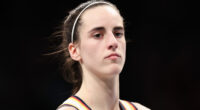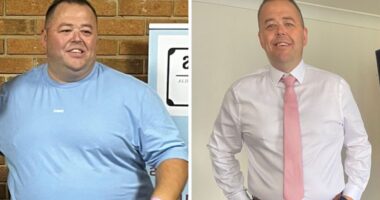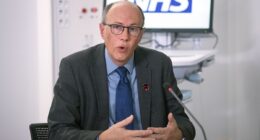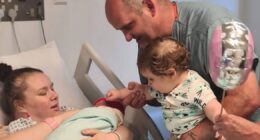A doctor who started going blind in medical school has said her potentially career-ending condition has actually made her a better doctor by teaching her ‘the importance of advocating for your own health.’

Dr Tara Narula, a cardiologist in New York City, lost part of her vision in medical school
Cardiologist Dr Tara Narula, from New York City, was sitting in a lecture hall during her second year of medical school in the early 2000s when she noticed colored lights blinking in the corners of her right eye.
Her symptoms continued for several months until she went home for the holidays. She visited an eye doctor who found no issues other than a small hemorrhage in the back of her right eye – which is when blood vessels break in the eye, causing bleeding.
However, when a neuro-ophthalmologist ordered a test that required Dr Narula, now in her 40s, to press a button every time she saw a flash of light, ‘there were a whole series of flashing lights I had missed.’
Soon after, she was diagnosed with inferior arcuate defect, which leads to blurriness and spots in direct vision and has caused her to permanently lose the vision in the bottom part of her right eye.
‘Getting this news at the start of my medical career scared me, and I feared the absolute worst,’ Dr Narula, an associate professor of cardiology at Donald and Barbara Zucker School of Medicine at Hofstra/Northwell in New York, she wrote for TODAY, where she is also a contributor.
Her condition has stayed stable since she was originally diagnosed, and she now says her experience has made her a more empathetic doctor and better able to connect with and treat her patients.

Doctors are unsure what caused Dr Narula’s vision loss, though they have suggested that her eye became misshaped due to nearsightedness
Doctors were unsure what caused the vision loss, though they pointed to multiple sclerosis (MS) as a possibility. But after a series of MRIs, doctors ruled that out.
They also suggested it could have been from a small undetected stroke or from getting accidentally elbowed in the eye during a night out.
‘Being told something was wrong was difficult enough, but the hardest part was not having a real diagnosis or answer for what had happened to me,’ Dr Narula said.
She added: ‘In addition, not knowing if it might happen again or if my vision might continue to decline was one of the hardest things I’ve had to face.
‘It’s challenging to exist in that gray area, where there are some answers but a complete picture doesn’t exist.’
Though Dr Narula returned to medical school at the University of Southern California, she had a hard time focusing due to stress – that is until her mother gave her valuable advice.
‘She said that if I spend too much time worrying about what could happen, I wouldn’t enjoy the life that was happening,’ the physician aid.
The last specialist she saw now believes her severe case of nearsightedness – difficulty seeing objects far away – could have misshaped her eye, leading to her partial vision loss.
Inferior arcuate defect is a form of glaucoma, a group of eye diseases that affects 3million Americans.
While Dr Narula was initially frustrated with the unknown surrounding her condition, she said her experience has made her a better doctor.

Dr Narula, a medical contributor at TODAY, said that her vision has stayed stable since she was diagnosed, though she undergoes regular scans
‘Every time I go for my annual visual field test, I still worry. Every day, I realize in an instant I could once again be a patient,’ Dr Narula said.
‘Having been through my own journey always reminds me that behind every patient’s medical record number, image and chart is a human being who is scared and struggling to find their way to hope and a new normal.’
As part of her empathetic approach, she noted that every time a patient needs a test or scan, she makes sure to responds as soon as possible so that patient can have answers quickly.
‘I know how frustrating and frightening it is not to have a definitive diagnosis or know what will happen,’ she said. ‘Being a patient taught me the importance of advocating for your health.’
Dr Narula recently shared her tips for patients navigating their own health journey.
First, she recommends keeping an open mind and seeking out multiple opinions, especially for a condition that’s difficult to diagnose.
Similarly, she said it is important to find a doctor you are comfortable with – someone who will listen to concerns and make you feel ‘heard.’
She also suggested keeping a journal of symptoms and test results to bring to appointments.
‘I also encourage patients to ask for copies of all their tests, including MRIs, CT scans, bloodwork, etc.,’ she said.
‘That way, they have all the relevant information needed about their health and can share them with providers instead of waiting for a doctor’s office to send the results.’
And for women, who are dismissed by doctors far more often than men, Dr Narula said they should ‘learn to voice what they feel.’
‘Women know their bodies and when something is wrong. I advise my female patients to trust their instincts when something feels off, and don’t let others downplay it,’ Dr Narula said.
‘Advocating for health starts, in many cases, with believing in your own experience.’
An important aspect of navigating a health challenge is finding a support system to help you ‘grapple with the tough emotions of a difficult-to-diagnose condition.’
She recommends asking a friend or family member to accompany you to doctors appointments.
Dr Narula added: ‘It’s easy to feel overwhelmed in the health care system and wonder how you can possibly navigate a health challenge.
‘But my mother’s advice to me from medical school still rings true: “If you put one foot in front of the other and don’t look too far ahead, you’ll realize months have passed. Take it one day at a time.”‘










